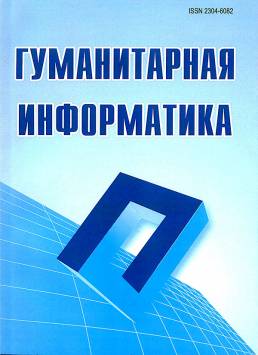THE POTENTIAL OF INTERACTIVE EDUCATIONAL TECHNOLOGIES INFLUENCE ON SOCIETY TRANSFORMATION
The article contains a discussion of the issue of interactive educational technologies influence on social behavior of students and as a result the transformation of the next generation of society. The issue is studying through the analysis of educational outcomes from the use of interactive teaching methods, identifying positive effects and risk factors. It has found out that there is a need for modern human to develop a raw of skills, including critical thinking. This skill can be developed through the interactive technology, that’s why there is a strong interest to study the effects of its application. At the same time, within the environment where delivering information to students is no longer a linear process, it starts to create a more complex nature of the relationship. In means that the teacher must not only have knowledge of the subject, but also he or she should be able to evaluate the contribution and the volume of knowledge learnt by students, taking into consideration their individual characteristics. The inability of the teacher to control the situation or lack of qualification raises a number of risks which is connected with students’ uncertainty: the formation of learner’s ideas could be based on false knowledge, it could lead to the loss of interest in learning, and the openness has a potential to transform into the suggestibility. Based on it we can highlight the relevance of the problem of possible social impact of education on the transformation of society. It is important today to prevent negative effects of the result of changes in the educational system which is processing nowadays. A more detailed study of this issue is aimed to form an educational approach which allows to extract the maximum benefit from the use of interactive technologies and minimize negative outcomes. The study of this issue is based on the following methodology: desk research (analysis of the modern educational programs, materials of conferences devoted to the modern trends of education), comparative analysis, synthesis.
Keywords
образование,
интерактивные технологии,
общество,
угрозы,
ответ,
развитие,
education,
interactive technologies,
society,
threats,
response,
developmentAuthors
| Darya A. Perevodchikova | National Research Tomsk State University | perevodchikova@list.ru |
Всего: 1
References
Sessoms D. Interactive instruction: Creating interactive learning environments through tomorrow’s teachers. // International Journal of Technology in Teaching and Learning, 2008, 4 (2), p. 86 - 96.
Avelen V. Help Seeking and Help Design in Interactive // Michigan state university official web site. URL: https://msu.edu/~mccrory/_pubs/Alevenetal.pdf (дата обращения: 05.09.2016).
Тарханова, И. Ю. Интерактивные стратегии организации образовательного процесса в вузе: учебное пособие // И.Ю. Тарханова. - Ярославль: РИО ЯГПУ, 2012.
Hylen M. G. The Impact of a Character Education Based Interactive Discipline Program on At-risk Student Behavior in an Alternative School. // University of Missouri - Saint Louis, ProQuest Dissertations Publishing, 2008.
Interactive Teaching Styles Used in the Classroom // Concordia University - Portland official web site. URL: http://education.cu-portland.edu/blog/tech-ed/5-interactive-teaching-styles-2/ (дата обращения: 10.09.2016).
Weiss, J., Matzkin, E., Flippin, M., Pallis, M. and Rankin, M. Get Up, Get Out, Get Moving: An Interactive Tool for Education at Your Local School. //Clinical Orthopaedics and Related Research, 2012, 471(4), pp.1226-1229.
What is Interactive Learning? - Overview & Tools | Study.com. // Education portal Study.com. URL: http://study.com/academy/lesson/what-is-interactive-learning-overview-tools.html (дата обращения: 18.09.2016).
Педагогический энциклопедический словарь / гл. ред. Б.М. Бим-Бад. - М. : Большая рос. энцикл., 2002. - 528 с.
Нестеров В. В. Образование как фактор социальной сплоченности и политической стабильности общества. // В.В. Нестеров Армия и общество, 2009. - №3. URL: http://cyberleninka.ru/article/n/obrazovanie-kak-faktor-sotsialnoy-splochennosti-i-politicheskoy-stabilnosti-obschestva (дата обращения: 08.10.2016).
Двуличанская Н. Н. Интерактивные методы обучения как средство формирования ключевых компетенций // Электронный журнал «Наука и образование». - 2011. - №4.
Ефимов П. П., Ефимова И. О. Интерактивные методы обучения - основа инновационных педагогических технологий // Инновационные педагогические технологии: материалы междунар. науч. конф. (г. Казань, октябрь 2014 г.). - Казань: Бук, 2014. - С. 286-290.
Каримова Л.Н. Использование интерактивных форм и методов обучения в процессе хормейстерской подготовки студентов педагогического вуза // Л.Н. Каримова Фундаментальные исследования. - 2014. - № 3-2. - С. 393-396; URL: http://www.fundamental-research.ru/ru/article/view?id=33646 (дата обращения: 06.10.2016).
Винер Н. Кибернетика и общество. // Н. Винер, М.: Издательство иностранной литературы, 1958. - 200 с.
Панина Т.С. Современные способы активизации обучения // Т.С. Панина, Л.Н. Вавилова Учебное пособие. 4-е изд., стер. - М.: Издательский центр "Академия", 2008. - 176 с.
Дюркгейм Э. Метод социологии // Э. Дюркгейм Западно-европейская социология ХIX-начала ХХ веков. - М., 1996. - С. 256-309.
